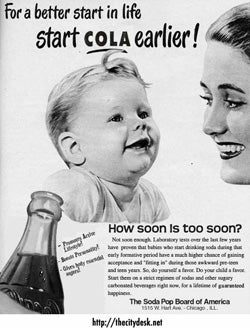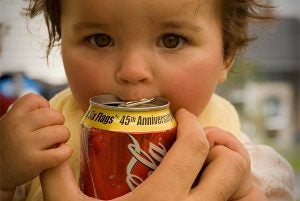 I’ve previously written about just how important the first three years of life are for brain development, and how food insecurity, malnutrition, stress and abuse can disrupt normal development of brain architecture and circuitry with life-long repercussions. This week, a study came out suggesting that exposure to something much more ubiquitous may have a similar effect on the brain: sugar.
I’ve previously written about just how important the first three years of life are for brain development, and how food insecurity, malnutrition, stress and abuse can disrupt normal development of brain architecture and circuitry with life-long repercussions. This week, a study came out suggesting that exposure to something much more ubiquitous may have a similar effect on the brain: sugar.
Researchers from Australia looked at the impact of drinking high volumes of sugary drinks on the brain development of rats. They found that sugary drinks caused more changes to the region of the brain that controls emotional behavior and cognitive function than extreme stress or abuse in early life.
They “found that chronic consumption of sugar in rats who were not stressed produced similar changes in the hippocampus as seen in the rats who were stressed but not drinking sugar.”
We know that the first three years of life are when we see the most rapid development of the brain and central nervous system. Hence, during this period, children are particularly vulnerable to circumstances that can interfere with cognitive development, and go on to cause irreparable damage impacting the rest of their life.
Many studies have previously demonstrated the links between highly stressful experiences early in life and long-term consequences for that individual’s physical and mental health. What is most concerning about this study is that sugary drinks had a similar impact as early life stress on the hippocampus, a part of the brain important for learning and memory, which we also know is impacted by early-life trauma. The researchers noted that though this research cannot be performed in humans, the brain circuits associated with stress responses and feeding are generally the same across species.
Meanwhile, the soda industry continues to target children around the world
 At the same time, a new report released last week by the Center for Science in the Public Interest shed light on soda industry behavior, which is following in the footsteps of tobacco and spending billions of dollars each year to increase soda consumption in lower-income countries. The report found that found that Coca-Cola has invested $12.4 billion in Mexico, which in 2013, had the highest per capita soda consumption in the world at 135 liters and leads the world in obesity.
At the same time, a new report released last week by the Center for Science in the Public Interest shed light on soda industry behavior, which is following in the footsteps of tobacco and spending billions of dollars each year to increase soda consumption in lower-income countries. The report found that found that Coca-Cola has invested $12.4 billion in Mexico, which in 2013, had the highest per capita soda consumption in the world at 135 liters and leads the world in obesity.
Even more concerning is that although both Coke and Pepsi have made public pledges to avoid marketing to children, the report noted many examples of the industry using cartoon characters, advertising at schools, young celebrities and even Barbie to specifically target children. The report refers to a study from South Africa, where sugar-sweetened beverages were the third-most commonly consumed food or drink among urban children aged 12 to 24 months.
The report makes a number of recommendations – all very familiar to the public health community – including to restrict the sugar content of drinks, levy taxes on sugary drinks, restrict marketing and many others.
Time to step up the fight against the soda industry
Given what we know about the dangers of sugar, and that unlike most food products, soda provides no nutritional value, it seems ridiculous that corporate giants like Coke and Pepsi are still setting the agenda worldwide.
Many low and middle-income countries are already struggling with serious physical and cognitive developmental problems due to malnutrition; one in four of all children in the world are stunted and in developing countries this can rise to one in three. At the same time, the vast majority of overweight or obese children live in developing countries, and we know that sugary drinks are a major contributor to the obesity epidemic.
If, as this new research suggests, sugary drinks are another risk factor for child cognitive development – it’s even more concerning that we seem to be doing so little to curb the soda industry’s influence worldwide. How much more evidence of harm must we wait for before governments will start taking real action?



